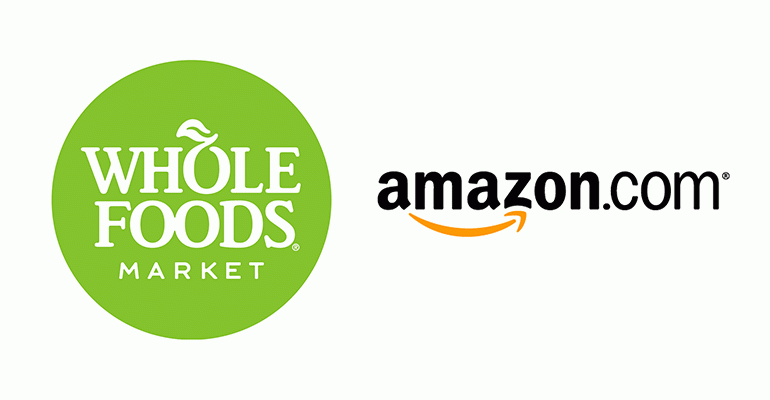Amazon said Friday that it has entered into a definitive agreement to purchase Whole Foods Market for $13.7 billion in cash in a deal that connects the leading internet retailer with the innovative but struggling natural foods pioneer.
The deal will pay shareholders $42 per share of Whole Foods — a 27% premium over its closing price Thursday.
The purchase, which is expected to close in the second half of the year, would represent Amazon’s largest foray into brick-and-mortar retail and provide a $16 billion annual jolt to food sales. The ecommerce giant has pursued food through various avenues for several years.
Related: Five potential impacts of the Amazon-Whole Foods deal
“Millions of people love Whole Foods Market because they offer the best natural and organic foods, and they make it fun to eat healthy,” said Jeff Bezos, Amazon founder and CEO. “Whole Foods Market has been satisfying, delighting and nourishing customers for nearly four decades — they’re doing an amazing job and we want that to continue.”
For Whole Foods, a new corporate parent could ease pressure from investors demanding better performance as the retailer transforms its business in the wake of mainstream competitors adapting a natural foods positioning. This move could also give Whole Foods room to make necessary investments in technology and infrastructure.
“This partnership presents an opportunity to maximize value for Whole Foods Market’s shareholders, while at the same time extending our mission and bringing the highest quality, experience, convenience and innovation to our customers,” said John Mackey, Whole Foods Market co-founder and CEO.
Whole Foods has been the topic of industry speculation since activist investor Jana Partners acquired nearly 9% of its stock earlier this year, proposing new board members and a slate of changes it said would result in improved financial performance. Whole Foods subsequently made its own changes to the board. The chain announced an ambitious slate of changes including the nationwide rollout of an affinity program, the introduction of more cost-effective category practices and plans to slash $300 million in costs and return the chain to positive comps and earnings growth by the end of 2018.
Recent reports had suggested Whole Foods as a candidate for takeover by a traditional grocer like Kroger Co. Industry observers in the meantime had argued Whole Foods would be better off as a private company.
John Mackey, the combative and outspoken Whole Foods co-founder and CEO, will remain with the company, which will also maintain its Austin, Texas headquarters. Mackey reportedly called Jana “greedy bastards” in an interview earlier this week, dismissing Jana’s stake only as a means to enrich itself and force a sale of the company on its terms.
Amazon and Whole Foods did not disclose details of how their partnership would evolve, but the deal could provide one avenue for Amazon to expand food sales. Until now, Amazon’s food sales have come mainly through items on its website and through the nascent Amazon Fresh concept which provides members of its Prime loyalty group with grocery home delivery for an additional monthly fee.
Amazon has also been at work on drive-up grocery stores and a convenience store but those concepts could take years to develop.
Wal-Mart in the meantime has been growing its e-commerce business with an eye on Amazon, and operates more than 4,000 U.S. stores. Walmart has touted synergy between physical and virtual retailing capabilities — particularly in food — as a competitive advantage.

